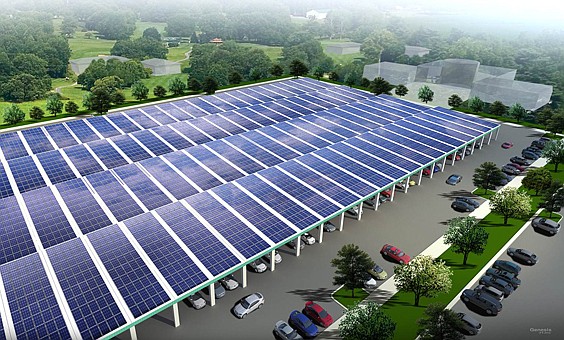- April 24, 2024
-
-
Loading

Loading

The Winter Park City Commission took a step toward sustainability Monday with the approval of a new solar canopy to be built by Cape Canaveral-based company Clean Footprint – the city’s first significant project in solar energy.
Construction for the 2.25-megawatt parking lot car-cover canopy is expected to start in October at the city’s Central Public Works compound.
Commissioner Leary and Commissioner Cooper expressed concerns about whether the land could be used for a better purpose in the future, but the motion giving Clean Footprint the go-ahead to build was passed by a vote of 3 to 2.
“The solar canopy and the solar option expands the procurement of energy to our city,” Mayor Ken Bradley said. “It also provides a solid 25 years of funding to our city portfolio of how we purchase electricity.”
“This is a simple first step and a no-risk step and a great opportunity to see how this works.”
The 4.4-acre canopy is planned to cover a parking lot in front of the compound, and will account for .6 percent of the city’s electricity.
“The citizens of Winter Park will know that every time they turn a light switch on that a piece of that energy came from solar, and that’s pretty neat,” said John Porter, managing partner of builder Clean Footprint.
An original proposal for the canopy was presented to the Commission during a meeting in June to have its electricity sold at a fixed rate for the next 25 years.
The Commission raised concerns that this would constrict the city if it wanted to get out of the agreement. Monday’s proposal also came with an agreement of up to 25 years, but broken down into a 10-year period followed by five-year increments to give the city more flexibility.
Winter Park residents spoke in favor of the project during the public comment portion of the meeting before the Commission’s vote.
“There is no doubt that solar is something that we have got to start moving toward, and if it’s in baby steps, like is being proposed today, than that’s the place to begin,” said resident Deirdre Macnab, who is also the president of the League of Women Voters of Florida.
“It’s innovation, it’s forward thinking, it’s sustainability and these are the kinds of actions that we have to take in the state of Florida if we’re going to protect our beautiful natural resources.”
The power of the new solar canopy would come at a fixed rate of 6.5 cents per kilowatt-hour for up to 25 years – a rare value for a solar power energy source, said Director of the Electric Utility Department Jerry Warren.
“If you go look at Gainesville, they have a substantial proportion of solar, and they’ve got a lot of it at 24 to 25 cents a kWh,” Warren said. “So 6.5 cents is a deal.”
This wasn’t the first time that Winter Park had been faced with a meaningful solar power project, Warren said. A solar power project proposed by Rollins College for the roof of the SunTrust building parking garage fell through after Commissioners modified it to the point where it wasn’t economical, causing Rollins College to drop the project, Warren said.
Warren said that the city can now have a chance to see if the technology will succeed as it develops over time. Though engineers and researchers are still finding ways to store solar energy in a cost-effective manner, cities need to start somewhere in order to reap the benefits.
“This is a small project, it’s a small investment and there’s no risk to my customers, so this is the kind of project that I’m looking for,” Warren said.
Regardless of how quickly the technology advances, Bradley said, the solar canopy project is a way for the city to prove that it’s onboard with using sustainable sources of energy in the future.
“From what I understand is that the technology is still not quite there for the transference of the sun into electricity, but it’s getting better every single day, and there’s a lot of things that are happening to make it better,” Bradley said. “The approval of this gets us in the door, gets us started and gets us realizing that we shouldn’t just rely on the fuels that we rely upon today in terms of fossil fuels.”
“We’re doing it in such a way that I think the citizens of Winter Park can hold their heads high that we are trying to see if this is a good alternative for the future.”